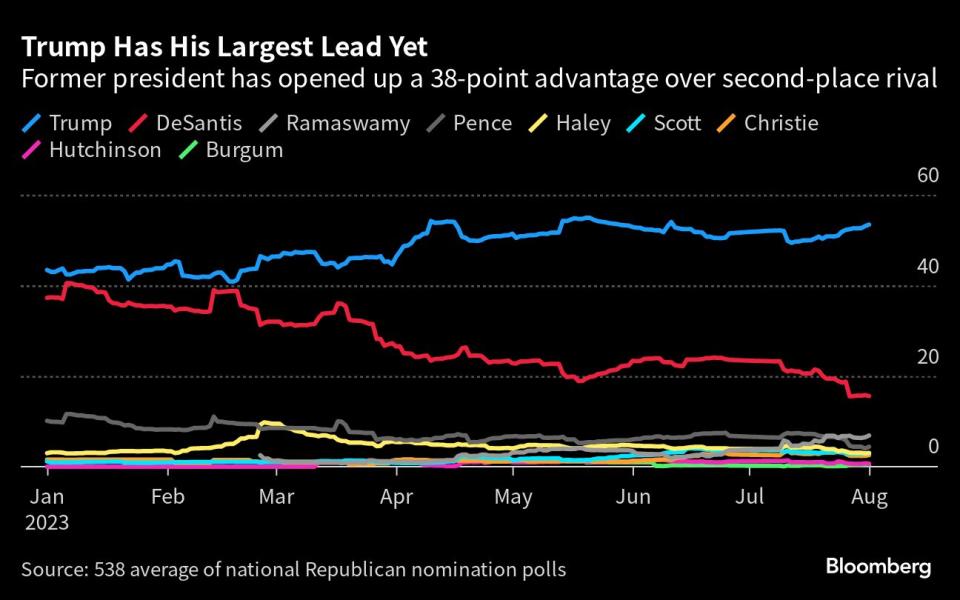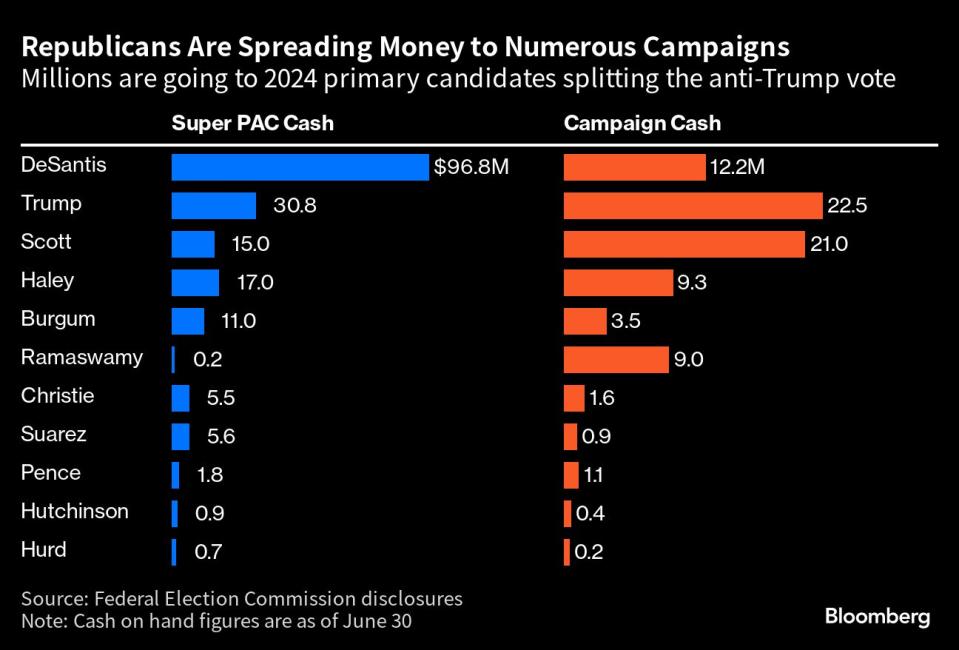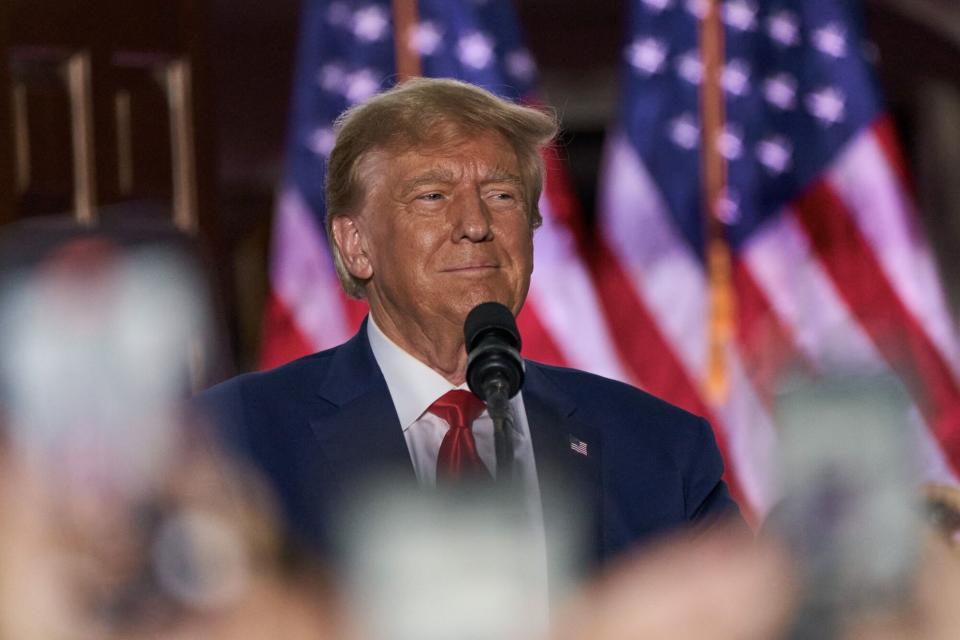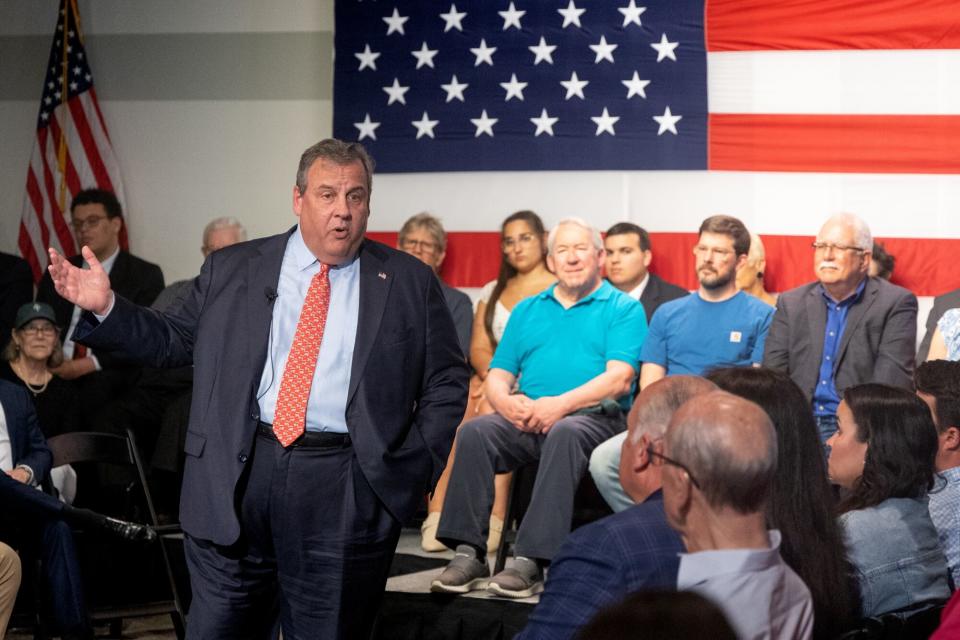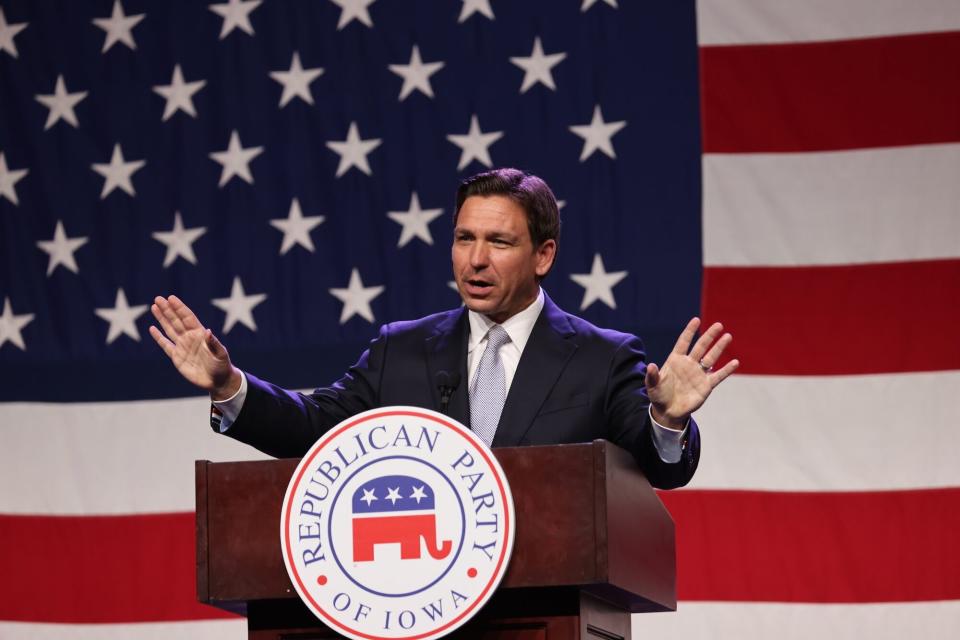Anti-Trump Republicans Are Actually Helping His 2024 Path by Scattering Their Cash
(Bloomberg) -- Republican donors who oppose Donald Trump risk foiling their efforts by spreading cash across the GOP field rather than focusing on one candidate who could defeat him for the nomination.
Most Read from Bloomberg
Trump Cites Self Incrimination Concern in Lawsuit Against Cohen
S&P 500 Wipes Out Almost 1% Gain; Bond Yields Drop: Markets Wrap
QQQ Churns in Late Hours on Apple, Amazon Earnings: Markets Wrap
Some big donors — including Alliance Resource Partners’ Joe Craft and Duquesne Family Office’s Stan Druckenmiller — are contributing to several candidates polling in the single digits.
Others, including billionaires Charles Koch and Susquehanna International Group’s Jeffrey Yass, are giving to super PACs that are trying to unseat Trump as the frontrunner, but have yet to back any of his challengers. A few of the biggest GOP donors in recent elections, including Miriam Adelson and Citadel’s Ken Griffin, haven’t contributed to any candidate yet.
“They’re still trying to figure this race out,” GOP presidential candidate Chris Christie told CNBC on Tuesday, referring to donors. “Everybody’s kind of holding back a little bit and seeing how the rest of us perform and seeing if somebody emerges from our group.”
The lack of coordination among those bankrolling the Republican primary creates a dream scenario for the former president, splitting the money and support from influential voices among the roughly dozen candidates in the race and repeating what even anti-Trump donors say was a mistake in 2016.
Party insiders worry Trump’s mounting legal problems will make it impossible for him to beat President Joe Biden. That fear was heightened Tuesday when Trump — who is the runaway frontrunner for the GOP nomination — was indicted for a third time — this time on charges that he conspired to obstruct the 2020 presidential election.
In a Siena College/New York Times poll released this week, 54% of likely Republican voters backed Trump, compared to 17% for the second-place finisher, Florida Governor Ron DeSantis. Every other candidate is polling in the single digits or below 1%, according to a RealClearPolitics average of polls.
Between his campaign and his allied super PAC, DeSantis currently has the most cash on hand of any candidate, though his operation is struggling to bring in new donors. Trump, who has a robust online donation apparatus, is less reliant on major donors than his challengers.
Read more: DeSantis Faces Donors Holding Back Cash as Campaign Flounders
But he is vulnerable — he faces his own money worries, namely millions of dollars in legal bills that are coming in more quickly than he can fundraise.
Trump, who was considered a long-shot candidate in 2016, managed to win the primary in a crowded field by garnering a plurality of votes in several early-voting states, while party insiders and donors split their support across his rivals. Senator Mitt Romney has called on Republican megadonors to “do something they didn’t do in 2016” — pressure candidates to withdraw if they can’t win and clear the field for a single Trump challenger.
“A few billionaires have already committed tens of millions of dollars. They have a responsibility to give their funds with clear eyes about their candidate’s prospects,” the Utah Republican said in a recent Wall Street Journal op-ed. “Family, friends and campaign donors are the only people who can get a lost-cause candidate to exit the race.”
Read more: Apollo’s Rowan Among Hosts for Tim Scott Fundraiser in Hamptons
In addition, there are several structural advantages built in to the GOP primary system that benefit Trump. Since 2016, the party has changed its nominating rules to be even more Trump-friendly, with more winner-take-all contests that would allow him to get all of a state’s delegates with less than a majority of support.
Still, the party has worked to narrow the 2024 field by instituting a series of progressively more stringent criteria to participate in its debates. Candidates need at least 40,000 individual donors and 1% support in a minimum of three polls to qualify for the Aug. 23 debate in Milwaukee, with those numbers increasing for successive debates.
So far, only seven candidates have made the cut — Trump, DeSantis, Christie, entrepreneur Vivek Ramaswamy, North Dakota Governor Doug Burgum, former Ambassador to the United Nations Nikki Haley, and South Carolina Senator Tim Scott.
That’s a smaller field than 2016, when 17 candidates participated in the first debate — so many that the party held an undercard debate of low-polling candidates mocked as the “kids’ table.”
Most Read from Bloomberg Businessweek
Influencers Built Up This Wellness Startup—Until They Started Getting Sick
AI in Hollywood Has Gone From Contract Sticking Point to Existential Crisis
With AI Booming, Gary Gensler Wants to Keep Finance Safe for Humans
Amazon Unveils Biggest Grocery Overhaul Since Buying Whole Foods
©2023 Bloomberg L.P.

 Yahoo News
Yahoo News 
